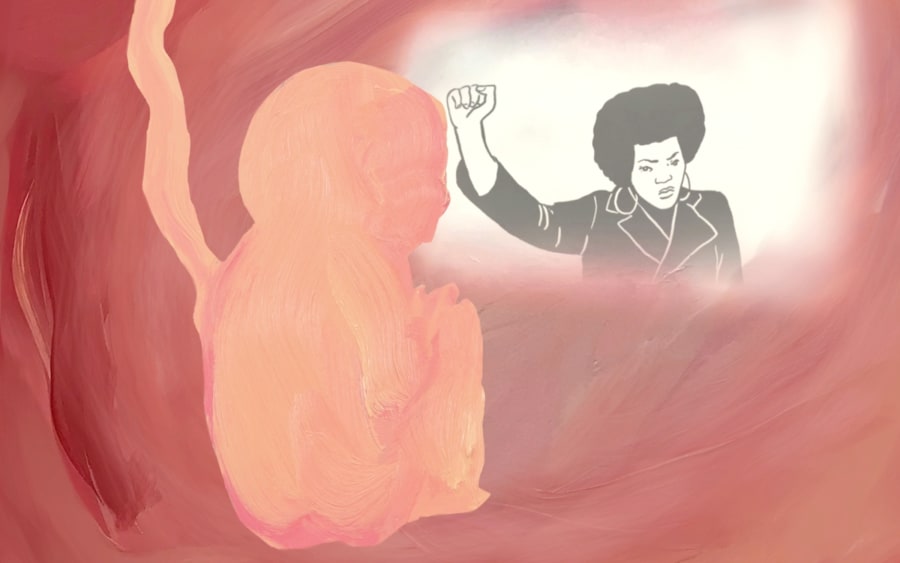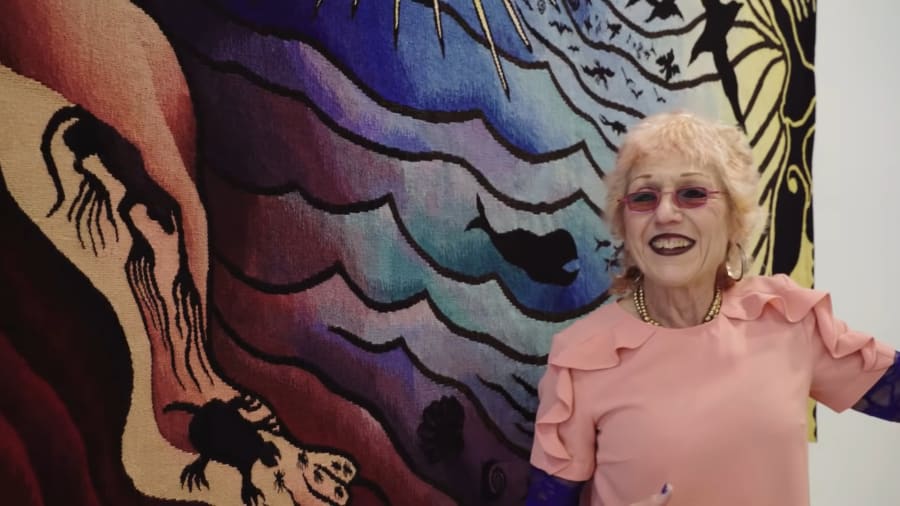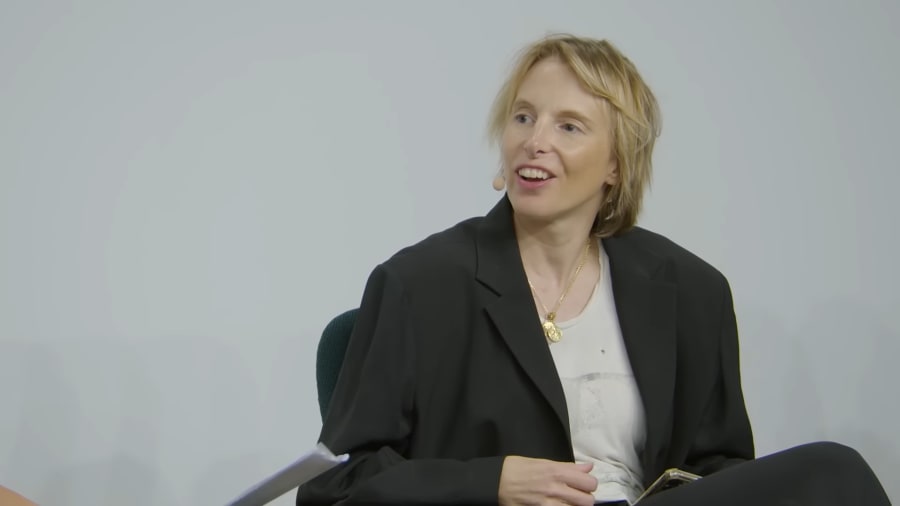Forty years ago, Judy Chicago set about countering biblical origin stories that pictured man as humanity’s central creative force: think Michelangelo’s bearded elder bestowing Adam with the touch of life. Her idea was to celebrate mothers giving birth, but her research uncovered an almost total art historical void. She had to go straight to the source, to actual mothers, to ‘build a form language almost from scratch’ she wrote in 1985. Chicago discovered then that ‘not only birth’ but ‘the very nature of this subject…was shrouded in myth, mystery, and stereotype.’
Her resulting ‘Birth Project’ (1980-1985) includes sometimes heroically vast depictions of vibrating birthing female bodies, fashioned in needlework by a wide network of women artisans who often worked at kitchen tables. At the time, the art and activism of Chicago and her fellow feminist pioneers was sidelined in the art world. This project was a testament to her determination to march to the beat of her own drum. It also brought her face-to-face with the systemic oppression mothers encounter. ‘As soon as one gives birth to a child, one is no longer free,’ she wrote at the time. She never became a mother herself; ‘There was no way on this earth I could have had children and the career I’ve had,’ she told The Guardian back in 2014.
Works from the ‘Birth Project’ can currently be seen in two major shows: ‘Judy Chicago: Herstory’ at the New Museum in New York, and ‘Unravel: The Power and Politics of Textiles in Art’ at the Barbican in London. The reappraisal of Chicago and her generation began with the 2007 feminist art survey ‘WACK!: Art and the Feminist Revolution’ which was first at the Museum of Contemporary Art, Los Angeles, and subsequently toured to the National Museum of Women in the Arts, Washington DC, MoMA PS1, New York, and Vancouver Art Gallery, Canada. Today, the artist is represented by Jessica Silverman and Jeffrey Deitch. In the past few years, both commercial galleries and public institutions have increasingly opened their doors to younger artists exploring motherhood. What’s more, many artists achieving both critical recognition and commercial success are parents themselves.
‘Acts of Creation: On Art and Motherhood’ – the Hayward Gallery’s touring exhibition that begins at the Arnolfini in Bristol this March with an accompanying Thames & Hudson book by its curator Hettie Judah – is the latest in a number of maternity-themed shows and writing. Other notable examples include ‘Mother!’ at Louisiana in Humlebæk, Denmark (2021), and The Baby on the Fire Escape: Creativity, Motherhood, and the Mind-Baby Problem (2022), by Julie Phillips, which explores how leading 20th-century figures have negotiated motherhood and art-making.
Through How Not to Exclude Artist Mothers (And Other Parents), an earlier study into the impact of motherhood on artists’ careers, Judah found that ‘artists were constantly being told that motherhood wasn’t a subject for important art,’ she tells me. Yet her research into the subject has coincided with ‘a wider cultural interest,’ and a boom in ‘art that allows us to see what doesn’t usually get talked about.’ ‘Acts of Creation’ features the work of 60 artists spanning the 20th and 21st centuries. It includes today’s leading contemporary figures – a generation who are moving beyond the idea that haunted second wave feminists, ‘that motherhood was a trap that would send women back into the kitchen,’ Judah explains.
One front-runner of this new generation is the Scottish painter Caroline Walker, whose celebrated monumental painting series ‘Birth Reflections’ (2022), depicting the undramatic workaday reality of hospital births at University College London Hospitals, was partly fueled by a need to come to terms with her own traumatic labor. ‘When I decided to make paintings about the early period of motherhood, I was worried it might be viewed as sentimental, or that I’d lose my relevance – that [people would think] I had a baby and now could think of nothing else!’ reflects Walker today. ‘I’m glad I went with my gut feeling to pursue it though, as it’s a really vital subject.’ Walker has also made paintings about her sister-in-law’s first days as a mother, for the exhibition ‘Lisa’ at Stephen Friedman Gallery in London in 2022. She recalls being told the subject would not have been seen in a commercial space a decade ago. ‘There has been a general movement culturally towards making visible the less visible experiences of those in society, and of considering how, where, and on whom we place value,’ she points out.
Others from Walker’s generation include Los Angeles-based Tala Madani who turned her lauded satirical vision on the social pressure put on mothers. Expanding on the wild, rampant energies of her well-known paintings of penis-obsessed potbellied men, the ‘Shit Moms’ of her eponymous series of paintings and animations (2019-), leave brown smears in designer interiors to literally contaminate the Insta-fuelled vision of sleek moms having it all. Camille Henrot, an artist long interested in the idea of origins, has found rich material in the post-partum body and her recent ‘Wet Job’ paintings and sculptures (2021-2022) have explored unchartered territory for visual art: the mechanical breast pump. Meanwhile the rarer cases of mid-career artists who have successfully made motherhood their focus – like Chantal Joffe whose psychologically dense portraits probe the evolving mother-child relationship – are no longer the outliers they once were.
Billie Zangewa whose large appliqué textiles depict the contemporary mom as a heroic figure amid the mess of family life, has lately found her work thrust into the limelight. ‘It was when I celebrated motherhood through my work that the world started listening,’ she says. ‘As life gets more complicated, people are looking for authenticity. And a person with everyday struggles, trying to raise their children, have a career, and revere the experience of parenthood through their artwork is refreshing and relatable. Bearing witness to art that speaks of someone’s daily life can be humanizing.’
In art, discourse around caregiving and identity has been in sync with wider movements like MeToo and Black Lives Matter, as well as the novel focus on the domestic realm and the individual’s relationship to community prompted by COVID-19 lockdowns. Judah cites ‘the long tail’ of influence of Maggie Nelson’s groundbreaking book, The Argonauts (2015), exploring the poet and critic’s experience of pregnancy and parenting as a Queer woman and her relationship with her transgender partner, which rendered her experience of motherhood cutting edge.
While the subject of parenthood has gained greater currency in avant-garde circles, the real-life hurdles that mothers face have not gone away. There are numerous challenges particular to the art ecosystem too, even if having a baby isn’t quite seen as the career dead-end it once was. Artist residencies for instance, are usually structured around the idea of artists as lone individuals, not people who are caregivers in a family group. Exhibition private views take place during children’s bedtimes.
Furthermore, successful artists like Walker, Madani, and Henrot are incorporating motherhood into practices that are already well-established. There are many remaining who, as Judah says, ‘have been laboring in this area forever,’ while the art world looked the other way. Through her research she inevitably encountered artists who had taken time out to care for a family only to discover there was no route back. ‘The idea that a woman in her 40s, 50s, or 60s who’d had children is not capable of making experimental or exciting or progressive art’ persists, she says.
Parenthood is not an experience exclusive to women artists or those directly negotiating the traditional roles of heteronormative family structures. The relative absence of the subject in work by fathers and Queer artists points to ongoing prohibitions as much as it might a lack of interest. Depictions of fatherhood’s concerns are revealingly rare. The Indian painter Mahesh Baliga is one exception, whose auto-fiction work includes strikingly tender depictions of babies, like Acting as Father (2022), a self-portrait in which the artist holds a tiny infant, or Baby From My Dream (2023), where a swaddled child appears from a painterly wash of purple and gold. Such paintings combine loss and fantasy to speak eloquently about a parenting issue that is rarely voiced – involuntary childlessness. ‘It’s a very personal and autobiographical take on the idea of fatherhood: the absence of a child haunts me often,’ he tells me. ‘A man’s emotions are often overlooked; it’s difficult to express. The taboo rests in vaunted ideas of manhood [where we’re supposed] to suppress this desire to have a child and our failure to do so.’
The intersex artist and activist Del LaGrace Volcano whose work is among those providing a Queer perspective in ‘Acts of Creation’, has spoken of a potential loss of Queer currency for those who become parents yet whose identity is typically established in opposition to hetero norms. Having garnered a reputation as a photographer of drag kings in America and the UK, they moved to Sweden in 2006, started a family, and went on to create works that celebrate their relationship with their son Mika, who calls them MaPa.
The experience of mothers and other parents is, Judah says, ‘not just an important subject for all, but a subject for important art.’ Though as Walker councils, ‘to see this subject as a universal one and not dismissed as a niche interest, is still a work in progress.’
Judy Chicago is represented by Jessica Silverman (San Francisco) and Jeffrey Deitch (Los Angeles).
Caroline Walker is represented by Stephen Friedman Gallery (London, New York), Grimm (Amsterdam, London, New York), and Ingleby Gallery (Edinburgh).
Tala Madani is represented by Pilar Corrias (London), 303 Gallery (New York City), and David Kordansky Gallery (New York, Los Angeles).
Camille Henrot is represented by Mennour (Paris) and Hauser & Wirth (Zurich, Hong Kong, London, Los Angeles, New York, Paris, Somerset, St. Moritz).
Billie Zangewa is represented by Lehmann Maupin (New York, London).
Mahesh Baliga is represented by Project 88 (Mumbai) and David Zwirner (New York, Hong Kong, London, Los Angeles, Paris).
‘Acts of Creation: On Art and Motherhood’, a Hayward Gallery Touring exhibition, will be at Arnolfini, Bristol from 9 March to 26 May, before touring to Midlands Arts Centre (MAC), Birmingham, (22 June – 29 September 2024), Millennium Gallery, Sheffield (24 October 2024 – 21 January 2025), and Dundee Contemporary Arts (Spring 2025).
Skye Sherwin is an art writer based in Rochester, UK. She contributes regularly to The Guardian and numerous art publications.
Caption for top image: Caroline Walker, Early Days, 2022. Copyright Caroline Walker. Courtesy the artist; Stephen Friedman Gallery London and New York; Grimm, Amsterdam / New York / London; and Ingleby Gallery, Edinburgh. Private Collection. Photo by Peter Mallet
Published on March 1, 2024.


